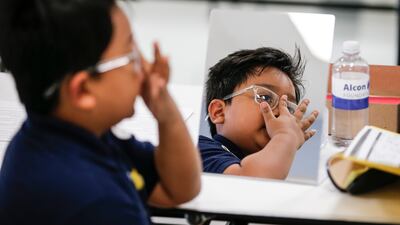An American doctor has used an award from the UAE to make major strides in the field of paediatric ophthalmology.
Boston Children's Hospital ophthalmologist-in-chief Dr David Hunter is the co-creator of Blinq, a device that can detect vision problems in young children. Dr Hunter and his team received a $50,000 award from the Sheikh Zayed Institute in 2014.
“It's been 10 years since we won that award but we do now have a device that's commercially available … to test preschool kids for this condition,” Dr Hunter told The National of the technology, co-developed with Dr David Guyton at Johns Hopkins.
Blinq can detect amblyopia – when one eye or both eyes have weak sight, making it difficult for people to process what they are seeing. Healthy eyesight could be hindered if the “lazy eye” is not caught early in childhood.
It can also detect microstrabismus, a misalignment that can result in crossed eyes or double vision.
Amblyopia and strabismus are the most common eye conditions in children. The National Institutes of Health says between 2 per cent and 5 per cent of the population has amblyopia and Boston Children's Hospital estimates 2 per cent to 4 per cent have strabismus.
“Hundreds of thousands of kids who have this problem … aren't getting detected,” said Dr Hunter, who is also a professor of ophthalmology at Harvard Medical School.
“So if you can pick this up … by 18 months of age, two years of age, three years of age, you've got plenty of time then to initiate glasses, patching, surgery, whatever is needed to restore the eye alignment issues.”
Both the US and UAE have mandated newborn screening for hearing loss and congenital diseases but vision is often not checked unless a prevalent and severe eye issue is detected – and eye care is often not prioritised until later years.
Only 14 per cent of US children younger than seven undergo eye exams, research by CooperVision found in February.
However, doctors emphasise that early detection and intervention is important for healthy eyesight.
The UAE health sector has supported eye check-up campaigns for young children, with the Dubai Health Authority's Public Health Protection Department holding a vision-screening campaign for more than 26,000 children in 2022 and 2023. And this year in the US, a bill was introduced in Congress that called for eye checks and vision care for young children.
“Vision and eye health is a critical aspect of a child’s healthy development that has been overlooked for far too long,” Representative Marc Veasey, who sponsored the bill, said in a statement.
Representative Gus Bilirakis, co-sponsor of the legislation, said: “As an American who has suffered from poor vision since childhood, I have a first-hand understanding of how critical early detection and treatment is when it comes to ensuring that all children have the best possible start in life.”
If passed, the bill would provide grants to US states and communities for vision screenings for early detection of issues in children – and enact approaches for referrals and follow-ups.
“That act is very important to promote vision screening as it properly should be done. The question is – what my bias is – what technology is going to be used to do that?” Dr Hunter said.
Beyond amblyopia and strabismus, Dr Hunter said Blinq's retina scan feature also detects low vision and other eye issues.
“Anything that causes a medical problem with visual acuity, where you cannot correct the eye to better than normal vision, then they're going to get a referral from this device,” he said.
The Blinq device has been used by state health departments, paediatricians and primary care physicians for three years now, with reported 97 per cent accuracy.
Dr Hunter said the Sheikh Zayed Institute award allowed for the expanding of his team, bringing the medical device out of the incubation stage in the laboratory and through required tests for federal approval. It is the first and only Food and Drug Administration-approved device that detects amblyopia and strabismus.
He said the award came at a “pivotal point” for Blinq and his company – Rebion, previously REBIScan – as without it “we might not have got past the incubation stage”.

It beat 56 submissions from five countries to be one of eight finalists and two winners in the category focused on paediatric surgical innovation.
Dr Hunter said three contractors were hired to contribute in various parts of development over seven years before the scanner was approved and adopted for use.
“Sometimes you wonder when you give these awards whether they're going to make it, make a difference … when you have a programme like this and these investments in research, they can take years to pay off, but eventually they do,” he said.
The company is currently working on another version of the device that is lighter, cheaper and easier to make.
“We just don't want to lose sight of the power of science and technology and research, and what it means to invest in ventures that may or may not look like they are promising at the outset,” Dr Hunter emphasised. “You never know which one's going to going to take off.”

